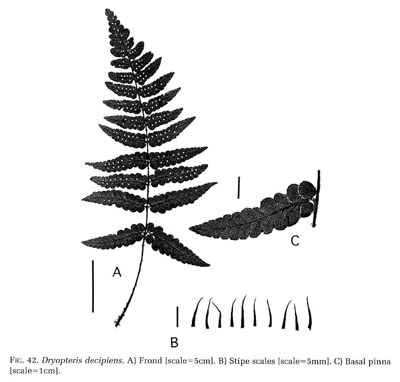| Dryopteris decipiens | ||
|
Etymology
Decipiens means deceptive or not obvious, but we don't have a clue as to what part of it is not obvious.
Description
Rhizome: erect, scaly.
Frond: 50 cm high by 10 cm wide, deciduous in colder areas, monomorphic, blade/stipe ratio: 3:1. Stipe: grooved, vascular bundles: 3-7 in a c-shaped pattern. Blade: 1-pinnate, lanceolate, leathery, linear to ovate scales below, absent above. Pinnae: 15 to 18 pair, anadromous on the basal pinnae, the lobe closest to the rachis separate, margins crenate; costae grooved above, continuous from rachis to costae; margins margins crenate; veins free, forked. Sori: round, in 1-3 rows between midrib and margin, indusium: reniform, at a sinus, sporangia: brownish. Culture
Habitat: on forest floor or at edge of lowland forests.
Distribution: Japan, China.
Hardy to -25�C, USDA Zone 5.
Distinctive Characteristics
bronzy new growth
Synonyms
Aspidium decipiens Luerss. Nephrodium decipiense Hook. |
|
|
